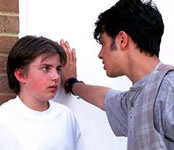| |
 Bullying Throughout The Ages Bullying Throughout The Ages
Many
parents, frustrated by tales of intimidation, resort to
advising their child to hit back at those children who
are making their son or daughter's life a misery at school.
Unable to be in the playground
to protect their progeny, this can seem the most obvious
solution: "Stand
up for yourself, don't them let push you around, you only
need to do it once and they will leave you alone."
Yet children
rarely follow this path if they are bullied, nor is it
necessarily successful in the simple terms expressed above.
What else can parents do?
Secondary school
Situations
which get physical, while perhaps the most serious, are
often also the most straightforward to deal with. The boundaries
of acceptable behaviour are clear: no-one should
be hurt or feel threatened by the violent actions of others
in coming to school.
Once schools are made aware
of this, they are usually committed to supporting those
who have been subjected to such aggressive behaviour and
apply sanctions to the bullies identified.
Other types of
bullying are often harder to deal with. Teasing,
which is persistent and aimed at humiliation, is verbal
harassment and can be a form of bullying. However, teasing
or "bagging" is
also a way in which many young people, particularly boys,
relate to each other, and so it is often hard to decide
what is said in fun and what constitutes bullying.
In frustration,
parents often tell their kids to "let him have it". Yet
by secondary school, many adolescents have been taught
that this will be severely punished and do not wish to
get into trouble. They are also often not physically
aggressive types, and although angry, are very uncomfortable
with the idea of getting into a fight.
Other forms of
bullying can be even more insidious, but are just as
damaging to the victims. Social
bullies, often girls, are expert at ostracising
those who don't fit in, or with whom they have had a disagreement.
The masters of this type of bullying may enlist others
to do their dirty work and so are even harder for teachers
to catch.
Passing notes, spreading rumours,
giving "greasies" (dirty looks), silent treatment, exclusion
from social activities are all part of this type of behaviour.
It is very hurtful, often confusing and isolates the victim
if it persists. While much of it happens at school, it
is also carried on after hours, on the telephone, and these
days, on the internet via chat-rooms as well.
Continue
to page 2 >

|

